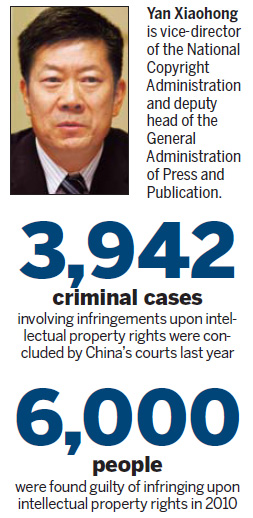Economy
Baidu urged to start new chapter in dispute
By Chen Xin (China Daily)
Updated: 2011-04-22 08:12
 |
Large Medium Small |
BEIJING - China's copyright authorities on Thursday urged Baidu, the largest search engine in the country, to come up with a plan to properly overhaul its online literary database.
The call came as investigations continued into a copyright dispute between the company and about 40 Chinese writers.
"Baidu's free literary database is not a good business model because lots of works within that database have not been authorized by writers," Yan Xiaohong, vice-director of the National Copyright Administration and deputy head of the General Administration of Press and Publication, said at a press conference.

"Copyright holders and writers have had a fierce response to Baidu's free literary database and we are investigating the case."
Yan said copyright authorities have spoken with Baidu's senior managers and the company has shown a "proactive" attitude toward the case and is considering how it might overhaul its database at wenku.baidu.com.
More than 40 writers, including Han Han, an icon among post-1980s writers, Jia Pingwa, Liu Xinwu and other big names from Chinese literature, posted an open letter online on March 15, accusing Baidu of stealing their work and infringing upon their copyrights by publishing their words without permission and offering free downloads.
Baidu countered by saying it had not made the works available but noted that Internet users uploaded them onto its database.
Negotiations between Baidu and the writers broke down when the search engine turned down the writers' request for compensation.
The writers have also been calling for a public apology and a halt to any ongoing case of copyright infringement, both of which were denied by Baidu.
Zhang Hongbo, deputy director-general of the China Written Works Copyright Society, represents the writers and welcomed the involvement of the copyright authorities in the Baidu case.
"In fact, we handed related materials to the National Copyright Administration two weeks ago and I hoped that it might help solve the dispute according to the law," he told China Daily on Thursday.
Zhang said Baidu should be able to tell the difference between works uploaded by writers looking for a wider audience and items that are protected by copyright.
| ||||
In March, Baidu pledged to remove all unauthorized literary works from its database and establish a revenue-sharing model that will ensure copyright owners receive a share of the proceeds from their work.
On March 28, Li Yanhong, chairman and CEO of Baidu, said the company was stepping up its anti-piracy efforts and hoped to work out a mutually beneficial business proposition that would settle the dispute.
Yan said more than half of copyright infringement cases in China were related to the Internet and the country was considering amending its Copyright Law, which dates back to 1990, to deal with the new challenges of the Internet era.
Qian Jun, a lawyer who specializes in Internet copyright infringement cases at the Beijing-based Yingke Law Firm, said the difficulty in identifying people who infringe upon copyrights on the Internet, coupled with the relatively high cost of bringing a lawsuit and the minimal amount of compensation one might receive has discouraged many copyright holders from actively protecting their intellectual property.
The fight between Baidu and the writers has highlighted rising public awareness of intellectual property rights in China, where fledgling software companies, record labels and other players in creative industries are estimated to lose billions of yuan every year to unlicensed copying, Xinhua News Agency reported.
According to a white paper released on Tuesday by the Supreme People's Court, the country's courts made judgments in 3,942 criminal cases involving intellectual property infringement last year, a 7.7 percent rise from 2009.
A total of 6,000 people were found guilty of infringing upon intellectual property rights in 2010, according to the paper.
Cao Yin contributed to this story.



